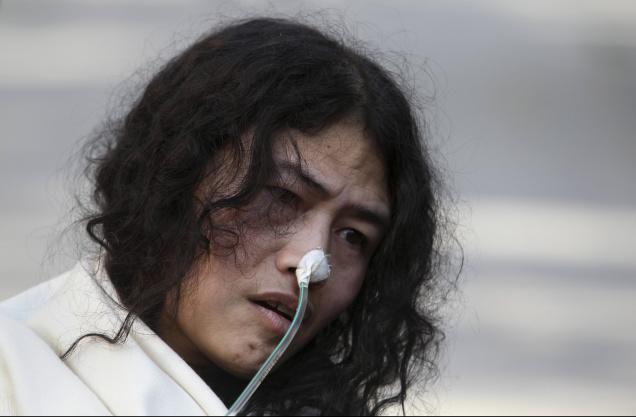New Delhi, October 30: The National Human Rights Commission on Wednesday issued a notice to the Manipur Government seeking immediate removal of the “arbitrary restrictions” imposed on visitors wanting to meet activist Irom Sharmila. She has been on an indefinite fast since November 2000.
The Commission, in its notice to the State Government Chief Secretary, has said that Ms. Sharmila, who is facing charges of attempt to commit suicide, must be permitted to receive visitors, a statement by the NHRC said here on Wednesday.
Known as the “Iron Lady”, Ms. Sharmila has been on a fast for over 12 years, demanding repeal of the controversial Armed Forces Special Powers Act (AFSPA) in her home State.
The Commission has asked the Chief Secretary to report to it by December 6 on the steps taken in response to this recommendation.
The notice was issued after the Commission took suo motu cognisance of the “arbitrary restrictions imposed on access to Ms. Sharmila”.
The rights body has recommended that the Manipur Government immediately remove the restrictions as these are in breach of India’s obligations under the international human rights standards and principles, and a grave violation of human rights.
The Commission has also observed that it believes that if the Manipur Government could deny permission to its Special Rapporteur, a retired Director-General of Police and to Special Rapporteurs of the UN, to visit Ms. Sharmila, it is unlikely that it gives others access to her.
“It would appear that, while keeping her alive, since her death would create problems for the State Government, it is trying to break her spirit through this enforced isolation, for which there is no judicial mandate, though she is in judicial custody,” the statement said.
The Commission said that Ms. Sharmila is a person of concern to it on three counts.
She is, firstly, a person in custody, on the terms of whose imprisonment the Commission has received some complaints. Secondly, it has been represented to the Commission, and to the UN Special Rapporteurs who have visited India, that the terms of her imprisonment have deliberately been made harsh because she is a human rights defender.
Lastly, in so far as she is held in conditions that are onerous because of her peaceful opposition to an aspect of government police, a law whose repeal she seeks, she is a prisoner of conscience.
Two Members of the Commission, accompanied by senior officers, had met Sharmila on October 23 during its visit to the State. She was found frail but alert and did not complain of any physical ill—treatment.
However, she repeatedly said that she was rarely allowed visitors, whereas all others in the custody of the State Government routinely receive visits from family and friends.
The State Government officers could not give any satisfactory reply to the Commission on this “egregious exception” made to the practice in her case, but was informed that permission to meet her must be issued by either the Chief Minister or the Deputy Chief Minister, the statement said.

